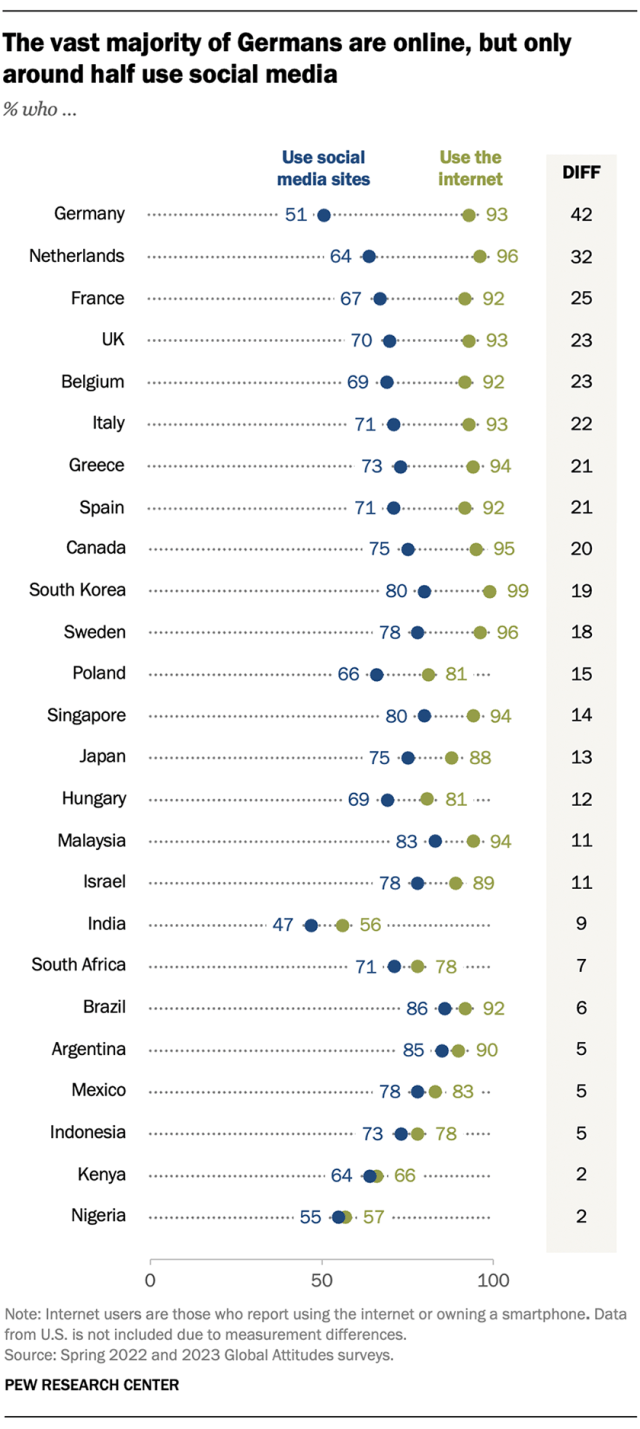
Internet use is nearly ubiquitous in Germany, but social media use is not. In fact, Germans stand out internationally for their relatively light use of social media, according to Pew Research Center surveys in dozens of countries.
This Pew Research Center analysis highlights the comparatively low share of German adults who say they use social media. It is based on Center surveys conducted in Germany and other countries in 2022 and 2023.
More information about these surveys and their methodologies, including the sample sizes and field dates, can be found at the links in the text.

The vast majority of German adults (93%) are online, meaning they use the internet at least occasionally or have access to the internet via a smartphone. But only around half of German adults (51%) report using social media sites like Facebook, Instagram, Snapchat, TikTok or X, the platform formerly known as Twitter.
This 42 percentage point gap between the share of German adults who use the internet and the share who use social media is bigger than in any of the other countries we surveyed recently. (The Netherlands is the only other country with a difference of more than 25 points.)
Consider some of Germany’s neighbors in Western Europe. As is the case in Germany, around nine-in-ten or more adults in Belgium, France, Italy, Spain, Sweden and the United Kingdom use the internet. But unlike in Germany, about two-thirds or more in each of these countries use social media.
In other parts of the world, internet use is less widespread than in Germany, but social media use is more common. South Africans, for example, are 15 points less likely than Germans to use the internet (78% vs. 93%), but they are 20 points more likely to use social media (71% vs. 51%). Put differently, internet users in South Africa are much more likely than internet users in Germany to use social media.
Social media use in Germany is comparatively low even among young adults
In every surveyed country, younger adults are more likely than older people to use social media. Since Germany is a relatively old country – with a higher median age than most nations – does its age profile explain its lower social media use?
Not necessarily. Even young German adults use social media at comparatively low rates.
While 100% of German adults under 40 are online, a substantially smaller share of them (79%) use social media. In neighboring France, by contrast, 99% of adults under 40 use the internet and 90% use social media.
Why is social media use lower in Germany?
We can’t say for sure why Germans are less likely than adults in many other countries to use social media. But the fact that internet use is so widespread in Germany suggests that it is not because of a lack of access to these sites.
Nor do Germans have an especially negative view of social media or its effect on society compared with people in other countries. In surveys conducted in 2022 and 2023, we asked people in 27 countries whether they think social media has been more of a good thing or bad thing for democracy in their country. In Germany, 57% of adults said social media has been more of a good thing for democracy. In France, by comparison, only 43% said this.
